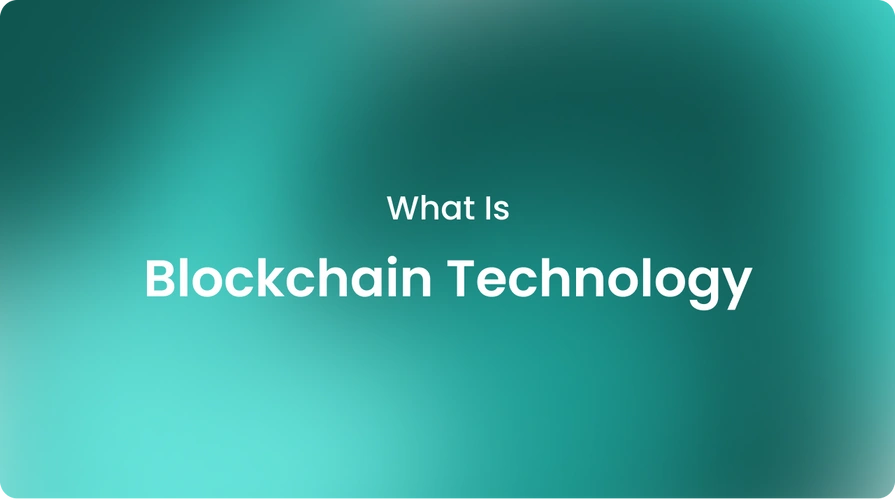|knowledgehub, technology
What Is a Smart Contract?

Smart contracts are computer programs that automatically execute the terms of a contract. They play an important role in blockchain technology by allowing more trustless and efficient transactions.
In this article, we will explore what smart contracts are, how they work, different types, and their significance for the future. By understanding smart contracts better, we can see how they are paving the way for a new digital economy.
Simply put, a smart contract is a self-executing contract with the terms of the agreement between buyer and seller written directly into lines of code. It contains a set of rules under which the parties to that smart contract agree to interact with each other.
The contract is coded, stored, and executed on the blockchain. Once the conditions of the smart contract are met, the agreed-upon terms are automatically carried out without the need for third-party involvement. Let’s take a look at smart contract examples!
What is a smart contract example?
Smart contracts are used in finance, entertainment, and real estate to settle insurance claims, trigger rewards, and carry out deals. They could get rid of paperwork and reduce stress caused by bureaucracy.
A classic smart contract example is travel insurance. The terms, like trip cancellation due to weather or illness, emergency medical coverage during the trip, etc., are coded into the smart contract.
Once the predefined conditions occur, like cancellation due to storm warnings, the agreed-upon compensation automatically gets transferred to the traveler without requiring an insurance company representative.
Cryptobunq offers crypto wallets, crypto APIs, e-commerce payment solutions, batch payments, and many more. With Cryptobunq's smart contract solutions, travel insurance companies can provide coverage against risks using blockchain-enabled smart contracts.
What are the different types of smart contracts?
There are primarily three types of smart contracts commonly used:
Financial smart contracts
These automate common financial agreements like loans, crypto payments, and escrow by verifying and enforcing the settlement of obligations programmatically without requiring trusted third-party verification.
Cryptobunq, a digital bank for crypto, offers crypto wallets, API access for your crypto exchange, and blockchain payment solutions leveraging smart contracts.
Asset transfers
Smart contracts streamline asset transfers by tracking ownership and automatically transferring titles upon fulfillment of contractual terms. Use cases include real estate, copyright licensing, digital media, and more.
Identity verification
Smart contracts verify user identities and attributes programmatically through decentralized identifiers (DIDs) stored on the blockchain.
Popular applications are cross-border payments, document notarization, credential verification, and KYC and AML compliance checks. Cryptobunq enables seamless identity verification and KYC integration.
How does a smart contract work, step by step?
Let's break down the smart contract process:
- Agreement: Participants define transaction parameters like payment amount and delivery address in computer-readable format.
- Deployment: A coded contract is deployed on a blockchain network through a node.
- Binding: A contract binds participants by storing identifiers on the blockchain.
- Execution: State and obligations are tracked when predefined conditions are met, like payment received.
- Resolution: The program executes terms like transferring assets automatically.
- Validation: Nodes validate the transaction and add it to blocks for permanent records.
- Immutability: Thanks to the consensus mechanism, such as PoW, PoS, and PoA, contracts cannot be altered undetectably.
The compilation, deployment, and triggering are automated through coding, eliminating the role of middlemen while keeping records open for audits.
Cryptobunq is a crypto-friendly digital bank offering various services in crypto and blockchain. Cryptobunq’s smart contract platform allows automatically processing transactions like payments, escrows, and more once conditions are met on the blockchain.
With Cryptobunq, users have full control over their digital assets and can integrate seamless smart contract-based solutions for their businesses. You can benefit from our wide range of crypto services from exchange APIs to node as a service solutions.
Can smart contracts be changed?
Once deployed on blockchain, smart contracts cannot be changed arbitrarily unless there is a change or self-amendment function coded into the original contract logic. This provides the advantage of immutability and predictability compared to traditional contracts.
However, if a bug or vulnerability is discovered, a self-amendment mechanism allows developers to patch vulnerabilities and upgrade contracts securely through procedural checks built into the code itself.
Alternatively, a new amended contract can be deployed, and the stakeholders can choose to migrate to the new one. Overall, changes to live contracts are more controlled compared to traditional contracts, where revisions are common.
Is there a smart contract on the blockchain?
Smart contracts reside, execute, and are validated on blockchain networks through distributed consensus among network blockchain nodes. The key advantages of running smart contracts on blockchain technology include:
- Immutability: Contract terms and history cannot be altered without network consensus.
- Redundancy: Code and state are replicated across nodes for redundancy and reliability.
- Security: Tamper-proof execution is ensured through digital signatures and hash-based verification.
- Auditability: Transaction records are open for verification due to transparency.
- Decentralization: There is no single point of control or infrastructure as computations are distributed.
Popular blockchain platforms supporting smart contracts include Ethereum, Solana, and Algorand, among others. Cryptobunq provides disruptive tools in blockchain infrastructure management by leveraging the benefits of contracts on decentralized networks.
Can blockchain work without smart contracts?
While smart contracts have augmented functionality, blockchain can operate independently for simpler use cases like digital payment and ledgering through the unspent transaction outputs (UTXO) model. However, smart contracts vastly empower blockchain applications by enabling:
- Complex conditional logic for multi step transactions.
- Automation of processes to reduce errors and disputes.
- Integration of off-chain data and events for real-world usage
- Self-enforcing, autonomous transactions without manual oversight.
Therefore, most distributed decentralized applications (dApps) being built today leverage smart contracts to decentralize business logic and enable new economies on blockchain networks.
So, while possible in limited contexts, smart contracts unlock the true potential of blockchains as decentralized ecosystems. There are also updated versions of them: smart contract 2.0 type.
Are smart contracts safe?
Nothing is completely risk-proof, but smart contracts in blockchain impart various advantages over traditional contracts to enhance trust, safety, and auditability.
- Open code: Because code is open, the community can spot vulnerabilities before they have a serious impact. For instance, analyzing code can find 87% of smart contracts' vulnerabilities.
- Immutable records: Transaction history cannot be erased, aiding forensics in cases of breaches.
- Tamper-proof execution: Protected by digital signatures and consensus
- Multisignature support: Requiring multiple private keys reduces central points of failure.
- Formal verification: Mathematical techniques can formally prove code functions as intended.
- Upgradability: Allow patching bugs through governance before exploits emerge.
Nevertheless, smart contract safety relies heavily on the quality of the code. Ongoing audits, responsible disclosure of bugs, and community diligence are efforts in progress to make smart contracts even more resilient against human and technical errors, such as reentrancy attack in smart contracts, over time.
How important are smart contracts?
As per industry reports, the global smart contract market size is projected to grow from $150 million in 2021 to over $1.5 billion by 2032, owing to increasing blockchain adoption. Some key benefits driving this growth are:
- Trust minimization: Automating agreement execution reduces reliance on centralized intermediaries. According to research, 30% of the population in East Africa has no access to banks.
- Cost savings: Manual oversight needs like lawyers and notaries are reduced through peer-to-peer programmatic enforcement.
- Transparency: Instructions and outcomes are visible, unlike opaque legal contracts.
- Scalability: Contract interactions can be handled automatically at a global scale.
- Ubiquity: Connecting systems across borders enables new digital business models.
Smart contracts will increasingly underpin self-governing decentralized autonomous organizations, jurisdiction-less marketplaces, and immutable digitized assets.
Going forward, organizations like Cryptobunq that simplify crypto integration will play a key role in accelerating the smart contract economy. CBQ is a one-stop shop crypto service provider that offers solutions for your diverse crypto needs.
Why are smart contracts the future?
Smart contracts are revolutionary as they represent a paradigm shift from manual transactions to self-executing automated agreements. Key trends suggesting they are the future include:
- Maturing ecosystems: Ethereum, Solana, and others focus on developer tools to boost dApp growth.
- Enterprise adoption: Cryptobunq, Amazon, and Microsoft provide cloud services for business use cases.
- Mainstream applications: Areas like insurance, wills, and loans show real potential.
- Flexibility: Techniques like oracles broaden capability beyond finance to many verticals.
- Infrastructure development: Standards like ERC20 help for more robust, bug-free contracts.
- Scalability: Layer-2 networks improve performance for mass consumer-level usage.
Smart contracts are poised to permeate our daily lives, boosting efficiency across commerce, law, and governance. With continuous innovation, protocols like Ethereum will cement their role as global decentralized supercomputers running autonomous programs for a just world without intermediaries.
The bottom line: how smart contracts establish reliability without intermediation
Smart contracts have already become the driving force behind blockchain innovation by powering automated transactions and novel business models. As statistics on barriers to finance indicate, the benefits of trust minimization, cost optimization, and inclusion hold immense potential.
Networks like Ethereum and partners such as Cryptobunq are at the forefront of laying the foundation for a future where smart contracts make agreements more predictable, transparent, and equitably accessible for all.
If you want to benefit from secure, transparent and reliable transaction opportunities through smart contracts, CBQ is here to help you. Contact us today and start to explore the benefits of expert crypto solutions for your individual and business needs!













